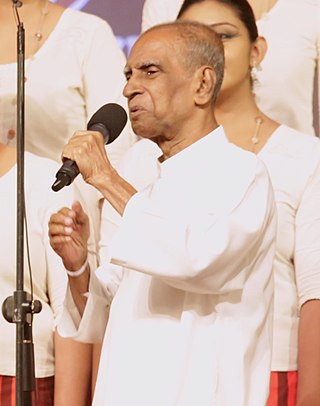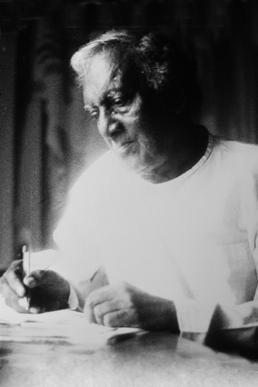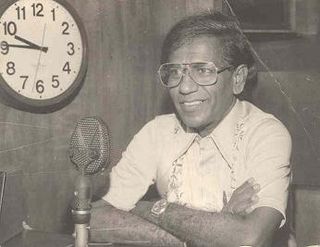Related Research Articles
Mahagama Sekera was a famed Sri Lankan poet, lyricist, playwright, novelist, artist, translator and filmmaker. He is considered to be a groundbreaking figure in Sinhalese poetry and literature. He is best remembered as a poet and songwriter with several of his works even becoming popular songs in Sri Lanka. His works occasionally have an introspective Buddhist-influenced outlook. His poems and songs remain widely quoted on the island nearly thirty years after his death.

Sri Lankabhimanya Wannakuwattawaduge Don Albert Perera, better known by his adopted name Amaradeva, was a prominent Sri Lankan Sinhalese vocalist, violinist and composer. Primarily using traditional instruments like sitars, tablas and harmoniums, he incorporated Sinhala folk music with Indian ragas in his work. Many consider his contribution to the development of Sinhala music as unmatched; hence, he is occasionally cited as the "Maestro of Sri Lankan Music".

Kala Suri Alhaj Kareem Mohideen Baig, popularly as Mohideen Baig, was a Sri Lankan musician. One of the most influential singers in Sinhala music, Baig is known particularly for his Buddhist devotional music. He is a Muslim who moved to Sri Lanka from Salem in Tamil Nadu, but of a Hyderabadi Muslim origin. He was considered a highly influential multicultural figure in the country's arts history. Baig is the first award winning citizen of Sri Lanka.

Sunil Santha was a Sri Lankan composer, singer and lyricist. He was pivotal in the development of Sinhala music and folk songs in the mid to late 1940s and early 1950s. He composed the beloved soundtracks to Lester James Peries' films Rekava and Sandesaya in 1956 and 1960. In a later comeback, he produced several experimental works.
Ranmuthu Duwa was the first colour full-length Sinhalese language film to be produced in Sri Lanka in 1962. It was co-produced by Shesha Palihakkara, Arthur C. Clarke and directed by Mike Wilson, who also made his debut as a feature director. The film stars some of those who would go on to become big names in the Sinhala Cinema, such as Gamini Fonseka, Joe Abeywickrema and Jeevarani Kurukulasuriya in the leading roles. Playback singing was by Nanda Malini, Narada Disasekara and W.D. Amaradeva. The lyrics were written by Chandraratne Manawasinghe.
Mohammed Gauss also known as Mohamed Ghouse, was a Sri Lankan film music composer. His compositions for Sinhala cinema in the 1950s are credited by music critics as having been influential in developing a Sri Lankan style of film composition distinct from that of Indian films.
Presidential Film Awards is a film award ceremony held in Sri Lanka. It is organized by the National Film Corporation along with the Presidential Secretariat and the Ministry of Cultural Affairs. It was 1st awards in 1979 by President J. R. Jayewardene, and continue till 2004. The awards were not held from 2005 to 2014 when Mahinda Rajapakse was president. The award started to be presented again in 2015 by President Maithripala Sirisena, and last awarded by President Ranil Wickramasinghe in 2023.

Sujatha is a 1953 Sri Lankan romantic musical film based on the Bollywood film Bari Behen. It was the most successful Sri Lankan film made up to that time.

Danister Thomas Fernando is a pioneer Sri Lankan lyricist. Some of the pioneers, whose names most people could not even remember were honoured. The oldest lyricist, D. T. Fernando, was a forgotten name.

Chitrananda Abeysekera (1930–1992) was a veteran broadcaster, poet, writer and an administrator. He joined Sri Lanka Broadcasting Corporation, then Radio Ceylon as a radio announcer and retired as the Director of Sinhala Services in 1989. He was also the President of Aganuwara Tharuna Kavi Samajaya for more than a decade and initiated a lot of programs that benefited poets and the public alike. He restarted Kavi Suwanda, the poetry newspaper for poets. Chitrananda dedicated his whole life to Sinhala poetry and literature, not forgetting Radio Journalism.
Asoka is a 1955 Sri Lankan romantic musical based on the Bollywood film Sheesa.
Sikuru Tharuwa is a 1963 Sri Lankan drama directed by L. S. Ramachandran and written by P. K. D. Seneviratne. It was developed by the Kurulu Rana group that attempted to make original movies pertaining to Sinhalese culture.
Dheewarayo is a 1964 Sri Lankan Sinhala drama film directed by M. Masthan and produced by K. Gunaratnam. It stars Gamini Fonseka and Sandhya Kumari in lead roles with Vijitha Mallika and Hugo Fernando in supportive roles. Music for the film is done by M. K. Rocksamy.
Eda Rae is a 1953 Sri Lankan film directed by Shanthi Kumar Seneviratne and Produced by Sisil Disanayaka. The film stars Sita Jayawardena and Herbie Seneviratne in lead roles whereas Shanthi Kumar, Premnath Moraes and Wanshawathi Daulagala made supporting roles. The music was directed by Mohammed Gauss.
Dharmasiri Gamage was a journalist, poet, writer and film director.
The 2004 SLC Twenty20 Tournament is the 1st season of the official Twenty20 domestic cricket competition in Sri Lanka. 15 teams in total, five representing four provinces of Sri Lanka and a Sri Lanka Schools XI team participating in the competition. The competition began on 17 August 2004, when Bloomfield Cricket and Athletic Club played the Police Sports Club at Colts Cricket Club Ground, Colombo.
Kala Suri Gnai Seenar Bangsajayah,, popularly known as G. S. B. Rani, was a Sri Lankan actress in Sri Lankan cinema, theater as well as a songstress, politician and a media personality. She was one of the most popular playback singers in early Sri Lankan cinema industry with a career spanned over five decades.
Mudunkotuwa Munasinghe Arachchige Leelawathi Perera, popularly known by her stage name Wasantha Sandanayake, was a Sri Lankan singer, primarily worked as a playback singer in Sinhala film industry. She is often described as the female symbol in the Buddhist song tradition of Sri Lanka Music.
Richard Herbert Seneviratne, popularly as Herby Seneviratne, was an actor and filmmaker in Sri Lankan cinema.
References
- ↑ Rajadurai, Therese Rajeswary. "Lester and Ceylon's films - The Hindu".